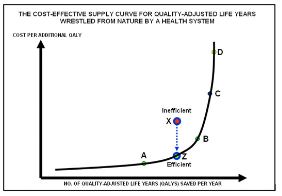(See? It really is as easy as pie. The solid, upward-sloping supply curve means that any point on the curve represents the least expensive medical treatment capable of producing additional Quality-adjusted Life Years (QALY). Thus, point “X” in the graph represents an inefficient form of medical intervention, since QALY could be delivered with an alternative therapy at the lower cost “Z.” Every intervention falling onto the solid curve, though, is assumed to reflect efficiently produced health care. Can you find Waldo? Enjoy! Graph courtesy Uwe E. Reinhardt.)
I missed a chance this weekend to get in line in front of the Supreme Court to get a seat for the oral arguments about the Patient Protection and Affordable Care Act (PPACA), a federal statute you may have heard about lately. There are only 400 of them- seats, that is- and all are first-come, first serve. It was a wet weekend in the capital, and thus only people who either don’t care about the early cherry blossom extravaganza commemorating 100 years of Peace between Japan and America (less 1941-45) down at the Tidal Basin or have really strong opinions about the PPACA, for and against, are there.
In fact, the passionate people got a head start on things and started queuing up on Friday.
I would have had time to get in line- Michigan State got ejected from the men’s NCAA basketball tournament last Thursday, and now there are no televised sports that I care about until the Master’s Golf Tournament, and I am a little leery about that event now that Tiger is winning on the tour again.
Thankfully, Associate Justice Clarence Thomas provided a sports analogy that should comfort all of us whose brackets went south so fast in the tournament. He likened the outside political pressure the Supreme Court is facing over the health care review to that of a free-throw shooter confronted with fans waving wildly behind the basket. Neither, in his view, has much impact in the end.
“Why do you think they’re never distracted? They’re focusing on the rim, right? That’s the same thing here. You stay focused on what you’re supposed to do. All that other stuff is just noise.”
He said that in answer to a question two weeks ago, and he has had the interim period to determine he will not recuse himself from the case. Both he and new Justice Elena Kagan have been under pressure to do so, since Thomas is married to someone who has professional opinions about PPCA, and Justice Kagan supported it as Solicitor General.
They both assure us that everything is OK, and the waving fans will have absolutely no impact on their deliberations.
I am not going to bother you with further details- the talking heads will maul this to death over the three days the High Court has allocated to hear the arguments. It is the most time they have spent on any argument in a generation. The highly politicized Supreme Court will listen to the arguments from the highly politicized litigants, who in turn are representing the highly politicized Attorneys General from a bare majority of the highly politicized states.
I am tempted to make a brief aside here- oh, hell, here it is. I contend that a significant contributing factor to why nothing seems to work very well these days is the Gerrymandering of Congressional Districts. The Framers would not recognize the electoral maps. In the self-serving bi-partisan effort to protect their collective backsides, the periodic re-drawing of Congressional district lines by Gerrymander has solidified the chasm of ideology between the Representatives. Senators have to play to voters in their complete states. Increasingly, the House is divided between the core lines of the more fanatical wings of the parties, and gutted the inclination for moderation and compromise.
This is basically a common-sense centrist country with a pretty good sense of fairness. Our government certainly doesn’t look like it. Just saying.
Anyway, at specific issue is the requirement contained in the law that requires individuals not covered by employer- or government-sponsored insurance plans to maintain minimal essential health insurance coverage, or pay a penalty unless exempted for religious beliefs or financial hardship, a provision commonly referred to as the “individual mandate.”
Before we get off into that Blue-and-Red thing, I should point out, just for the record, that the Socotra House Editorial Board has consistently been in favor of a single-payer system for health care. It should not be fair, for example, that former Vice President Cheney should get a new heart (he did, over the weekend) while others did not.
I will not countenance any titters or exclamations about what the former Vice President would do with one now that he has one. It is a process of timing, and need, and the metrics by which resources in a finite world are allocated. So there.
Other nations conduct their public health business in a starkly different manner. The examples of Canada and the United Kingdom being the systems that come most readily to mind. I always have been. We seem not to be able to come to grips with the notion that if we are to do something like that as a nation, there are some real issues to be addressed. Due to our national attention deficit disorder, all the arguments have been distilled to sound-bytes.
Commentators from the Commonwealth are fairly open about how this works. Trained medical and financial people have established something called the “quality-adjusted life year (QALY).” This is a metric used by a panel of docs and green-eyeshade accounting types to determine the monetary value of any given patient medical intervention.
It sounds sort of scary, but is quite reasonable, provided the subject is not you or someone you care about, since the QALY is based on the calculation of the number of years of life that would be added by the intervention. Each year in perfect health is assigned the value of 1.0 down to a value of 0.0 for death, again an entirely reasonable metric.
If the extra years would not be lived in full health, for example if the patient would lose a limb, or be blind or have to use a wheelchair, then the extra life-years are given a value between 0 and 1 to account for this.
I am not sure where I would factor into this, since a wheelchair would have been nice to have last week, but I am not sure what my QALY score might have been. I wince at the metrics, as applied to my left knee, and was pleased (I think) that there was no Emergency Services at Bethesda last Wednesday.
It is simple. There are not sufficient resources for everyone to get everything they want. There are indeed panels that allocate resources to the unique health care systems of both countries, which share the quaint idea about “queuing up” for all manner of things, including buses and social services.
The Brits are much better at this than American are, along with their polite cousins in Canada. Britain’s NHS, for example, was created in 1948 to provide a taxpayer-funded health system for all Britons, and is now the world’s fourth-largest employer of human beings.
It is overshadowed only by the People’s Liberation Army of China, the Indian railway system and Wal-Mart. About 32,000 family doctors in the UK work with the NHS, seeing 800,000 patients per day, according to the Department of Health in London.
Anyway, there are some issues with the system, since it has tended to grow in an unconstrained manner, QALY or not. There is a huge revision to the NHS system that is, in the words of press service Reuters, “big enough to be seen from space.”
The whole queuing-up concept never quite made it to these sometimes-placid shores. The most hysterical and effective image used by the opponents of PPACA is that of the “Death Panels,” the unelected appointed groups which will determine who gets what services and who doesn’t. I don’t think they call them “death panels” overseas, since there are plenty of other euphemisms for what they do. Whatever. The consequences are exactly the same.
Given the current economic unpleasantness, is it not fair to blame Grandma’s low QALY score on Goldman-Sachs for stealing all the public and private resources that could have gone to something worthwhile? Wouldn’t that have moved the QALY curve north from point “Z” to point “X” at least a couple months?
Just asking. Don’t tell Grandma. It would only upset her.
(Concerned citizens in front of the Supreme Court this weekend. Politico got the shot.)
Copyright 2012 Vic Socotra


